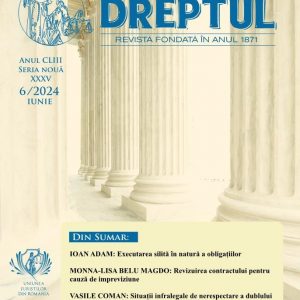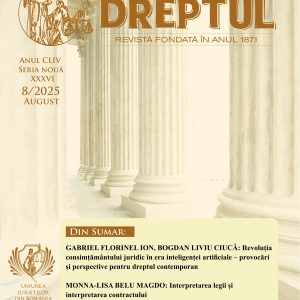-

-
 This study proposes an analysis of the regulation of the institution of return by right of ownership of land located in the built-up area, with particular reference to the interpretation of the provisions of Article 25 (1) of the Law No 18/1991, amended, supplemented and republished. In the thematic approach, there are presented a series of reasons meant to clarify the legal content of the terminology of the text, emphasizing the jurisprudential meaning of the syntagms used by the legislator. Thus, the notions of reconstitution, constitution and return by right of ownership are analyzed distinctly, showing that the text of law in question is incidental both in the assumption that the agricultural cooperative of production has attributed lots for use in the gardens located in the built-up area of the former owners to third parties, cooperative members who were not the owners of that land, and in the assumption that such lots were attributed to the former owners themselves, who became members of C.A.P., either on the same site, in continuation of the 250 square meters of personal property, according to the regulations of that time (the dwelling house and household dependencies, the land on which they were located and the yard), or on another site in the built-up area. Some critical remarks are made on some approaches coming from a land fund county commission, but also from the court, which, in our opinion, did not take into account the conceptual efforts of the doctrine and the judicial practice in the matter. We are convinced that reading this study will effectively contribute to the reduction to evanescence of the risk of bringing prejudice to the real protection guaranteed by the legal order in the field of establishment, defence and exercise of the legitimate rights and interests of the persons covered by this text of law.
This study proposes an analysis of the regulation of the institution of return by right of ownership of land located in the built-up area, with particular reference to the interpretation of the provisions of Article 25 (1) of the Law No 18/1991, amended, supplemented and republished. In the thematic approach, there are presented a series of reasons meant to clarify the legal content of the terminology of the text, emphasizing the jurisprudential meaning of the syntagms used by the legislator. Thus, the notions of reconstitution, constitution and return by right of ownership are analyzed distinctly, showing that the text of law in question is incidental both in the assumption that the agricultural cooperative of production has attributed lots for use in the gardens located in the built-up area of the former owners to third parties, cooperative members who were not the owners of that land, and in the assumption that such lots were attributed to the former owners themselves, who became members of C.A.P., either on the same site, in continuation of the 250 square meters of personal property, according to the regulations of that time (the dwelling house and household dependencies, the land on which they were located and the yard), or on another site in the built-up area. Some critical remarks are made on some approaches coming from a land fund county commission, but also from the court, which, in our opinion, did not take into account the conceptual efforts of the doctrine and the judicial practice in the matter. We are convinced that reading this study will effectively contribute to the reduction to evanescence of the risk of bringing prejudice to the real protection guaranteed by the legal order in the field of establishment, defence and exercise of the legitimate rights and interests of the persons covered by this text of law. -

-

-
 La 16 decembrie 2021 se împlinesc 150 de ani de când a văzut lumina tiparului primul număr al revistei „Dreptul”. Anul 1871 a avut o însemnătate aparte pentru lumea juriștilor români de atunci, marcând, pe de o parte, fondarea Societății Juridice și, pe de altă parte, apariția revistei „Dreptul”.
La 16 decembrie 2021 se împlinesc 150 de ani de când a văzut lumina tiparului primul număr al revistei „Dreptul”. Anul 1871 a avut o însemnătate aparte pentru lumea juriștilor români de atunci, marcând, pe de o parte, fondarea Societății Juridice și, pe de altă parte, apariția revistei „Dreptul”. -
 Este în afara oricărei îndoieli că tradiționala clasificare a constituțiilor în constituții rigide și în constituții suple rămâne o teză unanim admisă de către constituționaliști. Cei care critică această clasificare o fac fie din ignoranță (și aici replicile sunt inutile), fie din motive pur electorale, mai mult sau mai puțin motivate. Pentru liniștea sufletească a acestora din urmă, trebuie să se observe că doctrina constituțională explică foarte clar faptul că rigiditatea unei constituții nu se opune revizuirii sale. Rigiditatea constituțională este de fapt un procedeu tehnic (constituțional) care se legitimează prin stabilitatea în timp a constituției, ca trăsătură definitorie a acesteia. Iar stabilitatea constituției se fondează, la rândul său, pe realitatea că o constituție este o reformă, este cea mai complexă reformă, a cărei exprimare cere timp și, de ce să nu o spunem, răbdare.
Este în afara oricărei îndoieli că tradiționala clasificare a constituțiilor în constituții rigide și în constituții suple rămâne o teză unanim admisă de către constituționaliști. Cei care critică această clasificare o fac fie din ignoranță (și aici replicile sunt inutile), fie din motive pur electorale, mai mult sau mai puțin motivate. Pentru liniștea sufletească a acestora din urmă, trebuie să se observe că doctrina constituțională explică foarte clar faptul că rigiditatea unei constituții nu se opune revizuirii sale. Rigiditatea constituțională este de fapt un procedeu tehnic (constituțional) care se legitimează prin stabilitatea în timp a constituției, ca trăsătură definitorie a acesteia. Iar stabilitatea constituției se fondează, la rândul său, pe realitatea că o constituție este o reformă, este cea mai complexă reformă, a cărei exprimare cere timp și, de ce să nu o spunem, răbdare. -

-
 The problem of admissibility of revocation of the legal acts of labour law issued by the employer has been disputed for more than four decades. Within this framework, this study supports the affirmative solution, namely that of revocability by the employer of all its unilateral acts. Essential arguments consist in the specific nature of the labour legal relations, specific nature which excludes the application of the civil rules as rules of common law, according to Article 278 (1) of the Labour Code. While in the civil law the unilateral legal acts are, as a rule, irrevocable, in the labour law – an autonomous branch of law – the same category of acts are revocable.
The problem of admissibility of revocation of the legal acts of labour law issued by the employer has been disputed for more than four decades. Within this framework, this study supports the affirmative solution, namely that of revocability by the employer of all its unilateral acts. Essential arguments consist in the specific nature of the labour legal relations, specific nature which excludes the application of the civil rules as rules of common law, according to Article 278 (1) of the Labour Code. While in the civil law the unilateral legal acts are, as a rule, irrevocable, in the labour law – an autonomous branch of law – the same category of acts are revocable. -
 The postponing of the application of punishment is an institution recently introduced in the Criminal Code, creating problems of interpretation both in the doctrine and in the judicial practice, especially on two levels: the terminology used and the systematization of the substantive and procedural provisions in the legislation. These issues affect the institutions of the revocation and annulment of postponing the application of punishment.
The postponing of the application of punishment is an institution recently introduced in the Criminal Code, creating problems of interpretation both in the doctrine and in the judicial practice, especially on two levels: the terminology used and the systematization of the substantive and procedural provisions in the legislation. These issues affect the institutions of the revocation and annulment of postponing the application of punishment. -
 The author argues that, for repeated offense and continued criminal offense, the time of the offense, which determines reversal of the conditional suspension of execution of sentence is the first time the constituent elements of the offense were met and not when the offense was completely consummated. If the first time when the elements of the offense that enter the natural or legal unity of the repeated or continued criminal offense were met was discovered after the expiry of the trial period, the court shall not rule the reversal of the conditional suspension of execution of sentence.
The author argues that, for repeated offense and continued criminal offense, the time of the offense, which determines reversal of the conditional suspension of execution of sentence is the first time the constituent elements of the offense were met and not when the offense was completely consummated. If the first time when the elements of the offense that enter the natural or legal unity of the repeated or continued criminal offense were met was discovered after the expiry of the trial period, the court shall not rule the reversal of the conditional suspension of execution of sentence. -

-

